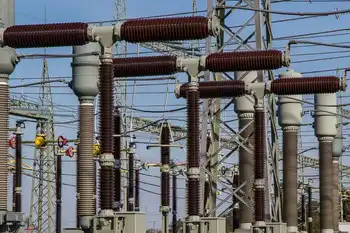Lease debate heats up for Four Corners plant in Arizona
By Farmington New Mexico Daily Times
Protective Relay Training - Basic
Our customized live online or in‑person group training can be delivered to your staff at your location.

- Live Online
- 12 hours Instructor-led
- Group Training Available
APS is approaching a self-imposed March 2011 deadline for tribal approval of a site lease and transmission lease that would ensure the power plant's future.
If leases are not completed, APS will begin looking to shut down the power plant, one of the nation's largest, and seek alternative sources of energy, said Mark Schiavoni, senior vice president of fossil operations for the Phoenix-based utility.
"We would not wait until the last minute," Schiavoni said. "By the end of March, we need to have more clarity around where these leases are going."
Hundreds of jobs, tens of millions of dollars in tax revenue and a major power source for the Southwest's electric grid hang in the balance.
The power plant's current leases end in 2016. If they are not extended soon, APS must begin a two-to-three-year process of decommissioning the plant and reclaiming the land, Schiavoni said.
The lease agreement fell short of a necessary super majority when it came to a vote in the Navajo Council on Jan. 7. The council has since been reorganized membership was cut from 88 to 24 councilors, and Ben Shelly was sworn in as president, succeeding Joe Shirley Jr.
The failed vote and governmental reorganization have thrown the lease into uncertainty.
"We are really at a loss for the reason for not approving that legislation, because of the lack of dialogue at that meeting," Schiavoni said.
A lease must be in place before APS spends hundreds of millions of dollars to upgrade the plant to comply with federal regulations. The U.S. Environmental Protection Agency wants the power plant to install pollution-control equipment that APS says could cost up to $1 billion.
Regulators pressure plant
APS plans to purchase a majority stake in two of the plant's five units for $249 million and shut down the three oldest units, which date to the 1960s. The plan must be approved by two state regulators, the Arizona Corporation Commission and the California Public Utilities Commission.
APS is one of the plant's six owners. The purchase of Southern California Edison's stake would increase APS' interest from 15 to 63 percent of units 4 and 5.
Southern California Edison was prompted to sell its share in units 4 and 5 to APS by a California law that discourages investments in aging coal-burning power plants.
If the purchase goes through, APS plans to continue operating Four Corners until 2041, a high-stakes gamble that coal will remain viable as pressure mounts to combat global warming.
"I think we've struck the right balance to be successful and to keep the plant running for the next 25 years," Schiavoni said.
The aging coal-fired plant has increasingly come under criticism from environmentalists as one of the nation's most polluting power plants, and federal regulators have targeted the plant for costly retrofits.
The EPA in October issued a proposed rule under the Clean Air Act that would cut the plant's nitrogen oxides emissions from 45,000 to 9,000 tons per year. Four Corners Power Plant is the nation's largest producer of nitrogen oxides, which contribute to haze and ozone.
The agency has extended the comment period on the proposed rule to March 18.
For the power plant, the rules are the result of long regulatory processes coming to fruition.
"These are not new issues," Schiavoni said.
Meanwhile, the power plant also faces regulatory challenges on the state level. In December, the Environmental Improvement Board approved new cap-and-trade rules that could further restrict emissions from power plants, including Four Corners.
A coalition of opponents, including the city of Farmington and the Farmington Electric Utility System, filed notices last week with the New Mexico Court of Appeals announcing their plans to appeal the rules.
Closing units 1, 2 and 3 as planned would cut the plant's capacity to generate electricity from 2,040 to 1,540 megawatts. APS would have to either purchase more electricity on the open market or find new sources of power.
Schiavoni said coal, which is plentiful and relatively cheap, must have a future in providing energy to America.
"I think there has to be," he said. "It's our most plentiful resource, and as such, we have to find a way to use it that is cleaner. I think the technology will be there."
The plant began operating in 1963, and it's showing its age. On Jan. 24, a tube leak shut down unit 3.
The mounting issues have Schiavoni wondering if the plant is worth continuing to operate.
"I go through that in my mind daily," he said.
Tribe seeks to protect jobs
For the Navajo Nation, Four Corners Power Plant is a major employer. The plant and the adjacent Navajo Mine that feeds it employ approximately 900, most of whom are Navajo.
The twin facilities provide high-paying jobs on the reservation, a rarity in a region where high unemployment persists.
"A lot of families are affected by this facility," said Larry Francis, Four Corners site manager.
APS plans to shed about 190 jobs at Four Corners Power Plant during the next two years as part of the partial shutdown. Employment at the power plant has already dropped from 549 in late fall to 523.
The Arizona utility vows to accomplish the job cuts through normal attrition.
"The most important thing we've done is committed to no layoffs," said Damon Gross, an APS spokesman.
The power plant is located on Navajo land and contributes approximately $60 million in annual tax revenue to tribal coffers.
The tribe is seeking to ease an expected drop in tax revenue from the plant when APS shuts down units 1, 2 and 3, said LoRenzo C. Bates, a member of the Navajo Council who has been involved in the lease debate.
"That's why we have a Navajo Nation negotiating team, to minimize that revenue loss that the nation would expect," Bates said.
Navajo leaders are also pushing to ensure the lease includes hiring preferences for Native Americans, and possibly specific preferences for Navajos, although the legality of a tribe-specific hiring preference is disputed.
The tribe appears to be growing more forceful in protecting its interests, said Lori Goodman, a spokeswoman for DinÂŽ Citizens Against Ruining our Environment, a Navajo environmental group.
"The nation is in a different era now that they've reduced the council," she said. "They're asking the right questions, anyway."
The unsettled governmental reorganization has delayed completing the leases, but the issue eventually will return to the council for another vote, Bates said. He said he was not able to give a more specific timeline.
There were some indications a vote could be nearing as this article went to press.
Schiavoni said he was confident the leases will win approval by the end of March.
"I think it'll get done," he said. "I'm optimistic."
The tribe would lose a major employer and source of tax revenue if a lease is not soon extended.
Bates expressed confidence that the lease will win approval.
He said simply, "It has to be."











